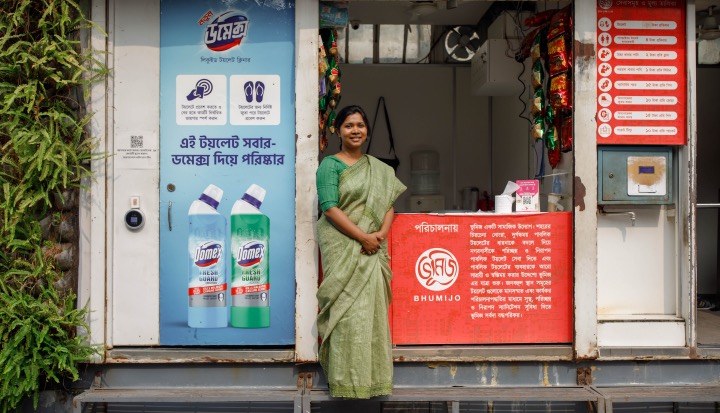
In a world that seems to push toward change at full speed ahead, it’s far too easy to overlook the challenges experienced by the masses in everyday life. Innovation has always been considered the creation of something new. More than this, it should be a way to build new systems within existing ones. Farhana Rashid launched her social enterprise “Bhumijo” in 2017, creating innovative solutions to one such overlooked issue.
Bhumijo operates out of Dhaka, Bangladesh. They provide hygienic, inclusive, and affordable access to clean toilets throughout the city. Expanding beyond this, Bhumijo provides extra services such as clean drinking water, laundry, and showers.
Farhana always knew she wanted to make a positive impact on the world, but was looking for a path that created change for underserved demographics.
“I wanted to do something for the most people, not only to serve the elite.”
Recognizing the toilet crisis and the lack of safe public spaces for women was the first step. It had been a problem directly affecting her world for years, but she became especially passionate about solving the issue after having a daughter.
Farhana explains that innovation occurs at different stages. This recognition of a problem was step one.
“You recognize a problem, ask why it is happening, and create a solution.”
Her approach could be described as a systemic solution. Using this pattern, you can identify the problem, analyze it, create and implement solutions, and evaluate and adapt the solutions. This is exactly what Bhumijo has done.
Farhana recalled having the initial discussion with her family. They debated all of these questions and she decided right then to pursue change. Farhana joked about the situation, showing that innovation doesn’t always happen in some formal setting.
“Sometimes innovation happens at the dinner table.”
There is a longstanding system of public restrooms in Bangladesh; however, that doesn’t mean that a push toward change should be off the table. While there are public restrooms, they are often inadequate. Women are especially affected by the unsafe spaces provided. This system is the context in which Bhumijo exists and builds upon.
“When we started, the percentage of women was almost 2 percent of total customers. Right now it’s around 20 percent… as a target, I would say I want my daughter and every daughter in Bangladesh to not worry when they are outside… I wanted to make a safe accessible space for them.”
The population of Dhaka is about 21 million people, condensed within the city. There are many ‘hot spots’ frequented by shoppers, storefronts selling anything from accessories to household items.
“Every day, thousands and thousands of people are coming to this space and most of them are women… we thought there should be women only toilets, and we didn’t find any.”
Upon discovering this, Farhana spoke with one market owner about installing a public toilet for women. To this request, she was told ‘women don’t come here to pee, they come here to shop.’ This was said in the context of thousands of women visiting the hotspots daily and more than 40 female employees at the specific site. Farhana continued to push her innovation in support of positive change and after a few more meetings, the market owner gave in and allowed Bhumijo to move forward with the project. Within 6 months, he contacted Farhana giving praise, and even requested a new installation for the men’s restroom.
Farhana remained innovative at all stages in developing the company. Various challenges arose, yet they were met gracefully by the team at Bhumijo. Resistance to change was a big obstacle to the team’s mission.
Now, Bhumijo operates 43 centers in Bangladesh. Over 10,000 are served daily, and the population of female users is consistently rising. Farhana takes great pride in being able to provide safe and inclusive spaces for the community, and rightfully so. Her approach to innovation was enormously successful. Bhumijo improves lives daily and continuously strives toward change.


Leave a Reply